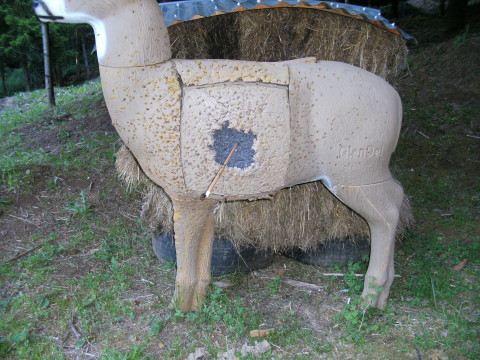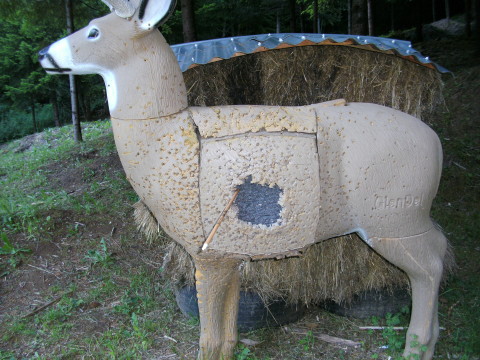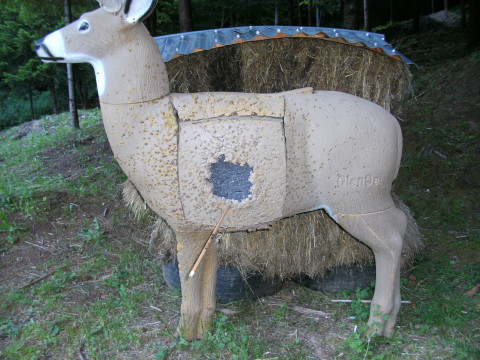Home › Forums › Friends of FOC › tuning ?
-
AuthorPosts
-
-
Hello, been doing a little bare shaft tuning and I’m getting this result. At 10 yrds nock high right,15 yrds a little nock left, fairly level,20 yrds alot more nock left but level.Have I cut too much or keep cutting? If I cut to much, I’ll add more weight from 400grs to 425 and see what happens.
-
Pretty sure I went to far. Back to the drawing board in the devils playground.
-
Good luck!
-
skinner biscuit wrote: Hello, been doing a little bare shaft tuning and I’m getting this result. At 10 yrds nock high right,15 yrds a little nock left, fairly level,20 yrds alot more nock left but level.Have I cut too much or keep cutting? If I cut to much, I’ll add more weight from 400grs to 425 and see what happens.
Now that’s some strange arrow flight. You sure that arrow ain’t possessed?
In my experience, a bare shaft will continue in whatever rotation it started in. Meaning if it comes off the bow nock high right, it stays that way, and gets more so. I can think of nothing that could explain how a bare shaft could go from high right to even left in 5 yards.
Are you watching the arrow in flight? Or observing how it rests in the target? If the latter, you may be getting a false reading.
It is best to get about 15 yards and watch the arrow in flight. When you get good flight at that distance, you can move back if you want. but being closer than 15 yards probably wont tell you much because there is not enough time to watch the arrow in flight.
Other folks simply draw (or tape) a vertical line on the target at which to shoot. If the arrow is left of the line, the shaft is stiff. Right of the line, weak.
If you get inconsistent results (sometimes right, sometimes left) that is usually a form issue. Make sure you are drawing the bow the same every time…
All of the above is based on assumption that you are right handed. Reverse for left handed. Thus if you are getting nock left at 20 yards, the arrow is still weak, and you can cut some more…
Hope this helps.
-
I second Steve on the likelihood of form, esp. release issues. I sometimes wonder if it would be helpful to use a trigger release for bare shaft testing. Has anyone here tried that? I just ordered a dozen shafts in three spines and am looking at some bare shaft tuning myself.
-
I was going by how it was resting in the target.:oops:…..DUhhh????..HEY BOY!
-
David Petersen wrote: I second Steve on the likelihood of form, esp. release issues. I sometimes wonder if it would be helpful to use a trigger release for bare shaft testing. Has anyone here tried that? I just ordered a dozen shafts in three spines and am looking at some bare shaft tuning myself.
Now that might be worth giving a go, it sure would eliminate my sometimes crappy release. 😀
-
David Petersen wrote: I second Steve on the likelihood of form, esp. release issues. I sometimes wonder if it would be helpful to use a trigger release for bare shaft testing. Has anyone here tried that? I just ordered a dozen shafts in three spines and am looking at some bare shaft tuning myself.
When tuning an arrow to a bow, what you are mostly doing is compensating for the archers paradox that is introduced by your fingers letting go of the string.
If you used a mechanical release, there would be essentially no archers paradox to correct for.
When bare shaft tuning, it’s important to have the bow set up exactly as you intend to hunt with it (string silencers, quiver with arrows, etc), and to shoot it in exactly the way you intend to shoot it when hunting : in order to tune the arrows for best flight.
I know you know this Dave. You are just testing me 8)
-
I may be mis-thinking but I thought that the paradox involved in arrow flight became a mostly porpoising effect with a mechanical release rather than the mostly fishtailing effect created resulting from a finger release. That might be a considering factor or maybe I’m barking up the wrong tree and that’s a problem here cause sometimes it’s far to the next tree 😀 Just my 2¢
-
I agree with Steve, you should move back farther. I was just bare-shaft tuning a bow yesterday, and it was difficult for me to see the arrow’s true flight from less than fifteen yards. When I moved back to twenty and twenty five yards it was very obvious if the shaft was too light or too heavily spined. From 25 yards the mismatched spines curve way out to the left or right, sometimes a couple of feet, so have a big backstop.
-
R2 wrote: I may be mis-thinking but I thought that the paradox involved in arrow flight became a mostly porpoising effect with a mechanical release rather than the mostly fishtailing effect created resulting from a finger release. That might be a considering factor or maybe I’m barking up the wrong tree and that’s a problem here cause sometimes it’s far to the next tree 😀 Just my 2¢
Here in we discover what, to me, is the most beautiful aspect of the traditional bow: Total Harmony. The traditional bow is in total harmony with itself, it’s arrow, it’s archer, and its purpose. I can think of no other man made contrivance for which this is so.
I could go on for some time on this, but suffice it that I mention 2 examples, the one you Alluded to (Archers Paradox), and the string nocks at the ends of the limbs.
First Archers Paradox. The paradox referred to here is related to the observation of the arrow on the bow, while the bow is braced. Look down the arrow, why it’s all crooked off to the side! How can it go strait when it is shot! No Way! That is the paradox. It can’t be, yet it is.
How can this paradox be? Because of the harmony between the archer and the bow. The archers fingers grasp the string from the outside in. When the archer releases the string, the string is pushed towards the archer (taking the back of the arrow with it) as his fingers uncurl. This happy fact allows the arrow to flex and bend around the handle of the bow, and ultimately straighten out and follow the trajectory predicted by the line of the arrow as it sat motionless between the string and the arrow shelf, directly under the archers searching and confident eye.
Second string nocks. Every part of the bow works with every other part of the bow, so that it can perform it’s amazing job in the most simple, and beautiful way, only a traditional bow can. A string nock is nothing more than a notch cut into the side of the limb. Yet it holds the string fast, and reliably. It allows the string to move as it needs to when the archer pulls the string to anchor, or lets the string go so that it can take it’s curved path back to it’s brace height. All the while, it transfers the energy from the archer into the bow limbs, and then from the bow limbs into the arrow. A string nock is everything it needs to be, and nothing more.
Now I need a cigarette 😳
-
In the old English castles, the shooting stations for the long shooting slots in the walls were about 15′ back from the wall in order for the arrow to straighten out or otherwise the arrow would have bounced off the edges or perhaps never departed the castle. So my thinking is ……….simple is best :D. Back up and see what your arrow is doing.
-
Steve — Beautifully explained, thank you.
Ralph — That being the case, the insides of those shoot-through slots in the wall should be heavily pecked by arrows that didn’t, in the excitement of an attack, make it through. That would be an interesting bit of history to personally observe and not likely anyone else would know what it was.
Are you doing sit-ups yet? 😛
-
Told you I was ancient!
I actually watched a documentary the other day where they were developing the weaponry and armor of the middle ages throughout the world. Was interesting. I cannot remember the guys name who hosts, he’s British I think. He and his associates build replicas and demonstrate such. Made sense to me watching and it’s logical. They showed where a pair of archers would almost have a continuous flow of arrows flying. They would even vary their pattern cutting the odds of someone flinging outside of guessing when someone be in the line of fire on the inside.
As far as sit ups. Nope. Not since I was kindly persuaded to perform them by my superiors when I was in the Corps. I performed them willingly and gladly at the time. :lol::lol:
I am getting around, just a bit more cautiously than normal. Shot some arrows. That didn’t hurt but pulling them :cry::cry:
-
Shot 20 and 25 yrd. Fishtail too the right 10 yrds then too the left. Never had luck with the 10 yrd thing. Heres my first shot at 25 yrds after adding 25 grs too point weight. Still too stiff.

-
2nd

-
3rd

-
What’s your bow weight? What spine arrow? From your arrow weight of 420 grains, that suggests you are shooting a 40lb bow…
The only time I have seen a bare shaft correct itself (going from right to left, or up to down, etc) is when it is way out of tune with the bow. I am guessing you are shooting a shaft that is way too light for your bow, and way too stiff. You may want to try increasing your point weight in larger increments.
If you are shooting carbon arrows, you can easily go up 50 grains before seeing much effect.
-
Steve I’m shooting a 61# @ 28″ recurve. I draw 26″ so around 54-53#. Shaft is a GT7595 with the weight being 768 grs. 315gr test point,two 5 gr brass washers ,100 gr insert. and 25 gr footing.
-
Where’d I get 425 grains from?
Everything looks right except for the spine of your arrow. If it was me, I’d go with a GT5575 arrow. Since your draw length is relatively short, you have plenty of room to work with.
Make a bare shaft. Glue all your stuff in the end. Then begin taking 1/2 inch at a time off the nock end. Just pull the nock, cut off, and reinsert nock. Repeat till you get good arrow flight. When you get closer, you can take less off…
If you try to make the arrows you have work, you will end up with an arrow that is way too long (not that too long is really all that bad) and way too heavy.
-
Went back to the GT5575. First thing I did was remove the footing as being at 2″ it was up against the shelf. Made me a 1″ one out of a old 2216 shaft from a hodgepodge box of arrows.Cut a 1/4 inch off arrow till I got good flight.Slight impact to left.Some nock high at 10 yrds, but level at 15,20,25,30 yards. Might do a little bit fine tuning but I think I’ll wait till I get a half dozen.As of now arrow weight 681 grs. foc 30%. Thanks Steve!:twisted:
-
-
AuthorPosts
- You must be logged in to reply to this topic.

